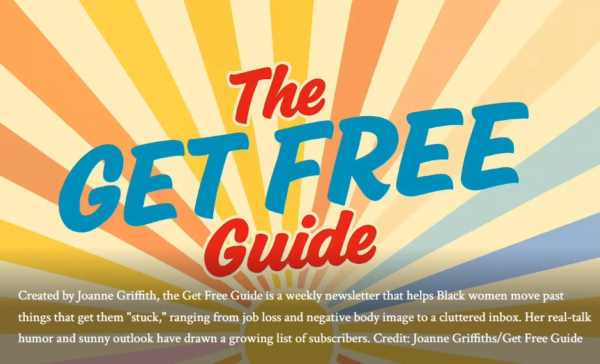Joanne Griffith’s “The Get Free Guide” redefines care and healing through radical honesty and humor.
Every Friday, Joanne Griffith tries to get the world a little more unstuck.
Her newsletter, “The Get Free Guide,” implores its readers — who are increasingly becoming evangelists, but more on that shortly — to do just that. The methods, like the one she dropped in the September newsletter, can be a little unconventional.
“Wherever you are right now, I need you to start clapping,” she wrote. “Don’t worry, you might look a little unhinged for a moment but you’re getting free. Three, two, one … GO!” A GIF of a clapping claymation penguin follows, setting the mood.
Then the real lesson hits: “Congratulations! You finally took a few seconds to clap 👏🏿for👏🏿 yourself!”
It’s clever, bite-sized wisdom — celebrating ourselves is easy yet often dismissed, but it is a good way to boost mood and self-worth — and Griffith’s upbeat, joyous tone helps it go down easy. It’s also a big reason her Get Free Guide newsletter is a source of inspiration as well as a tool of racial healing for its Black readers, who are often hit harder when “life is life-ing.”
A Space for Getting Unstuck
“We are all stuck with all kinds of things,” from too many emails in the inbox to negative thoughts or self-image, says Griffith, a veteran multimedia journalist from the United Kingdom who is a public radio executive in the U.S. The goal of the Get Free Guide, she says, is to create “a space for how we get unstuck from the things we think are hard or difficult.”
Although she doesn’t write for a target demographic, Griffith finds herself, more often than not, talking to and hearing from Black women like herself. Anyone is welcome in the space, she says, to “take what you need and leave the rest.”
RELATED: Ruha Benjamin: In A.I. Era, Black Women Must Reclaim Tomorrow
Clocking in at more than 200 subscribers and counting, the topics of Griffith’s newsletter — drawn from her own experiences, as well as conversations around her — tackles a range of experiences, situations, and emotions that keep people feeling “stuck.” Recent subjects include “Is Being Selfish Really So Bad?,” “Make DELETE Your BFF,” “The Layoff Is Not Your Fault,” and “Let’s Retire Resilience.”
“I start from a place of ‘What are the resources that people will find helpful, what is the support people might need, and what is the conversation that we can open up?’” she says.
Small Changes That Add Up
Many of the methods she recommends center on altering readers’ mindsets from negative to positive. She also urges them to follow her in making smaller, more immediate changes and healthy mental habits that add up over time, rather than fixating on solutions to major problems that could take years to resolve.
While Griffith’s approach is confident and optimistic, she wasn’t sure her newsletter would succeed when she launched it this June. Like anyone starting a new venture, she had doubts — “I questioned if anyone is going to like this,” she says — but took the plunge anyway.

Griffith chose a newsletter — free to subscribers — as the format for “Get Free” because of the inherent nature of digesting an email at one’s own pace. “There’s something about writing and just receiving an email,” she says. “People can choose to engage with it when they want to.”
You Are Not Your Numbers
One post in particular struck a chord with several readers, so much so that they passed it around a few times, and it made its way back to Griffith, over and over again.
The discussion centered on numbers attached to women’s bodies — information such as body mass index, weight, and blood pressure. It evolved into an acknowledgement that the bodies of Black women are unfairly rated or judged on such metrics, reinforcing ugly stereotypes and driving down their self-esteem.
Griffith took the topic head-on, and unapologetically: “Your numbers are not reflective of who you are as a human being.” The advice was resonant, and readers reached out to acknowledge it.
As sure as the sun will shine and the moon will come out at night, life will always life.
“I had someone say, ‘This gave me the words to help my daughter understand that there isn’t anything wrong with her and her physicality, this is who she is, and numbers are just numbers,’” Griffith says.
Though the Get Free Guide is less than a year old, Griffith has her eye on going deeper into specific topics — particularly bodies and technology — with in-depth, longer-form dispatches and guides. Until then, she continues to add to the growing community.
“It’s global, it’s connection, it’s resources,” she says. “It’s ‘how do we get unstuck when life is life-ing,’ because as sure as the sun will shine and the moon will come out at night, life will always life.”


